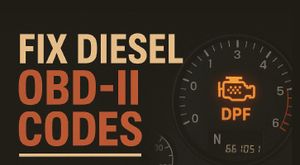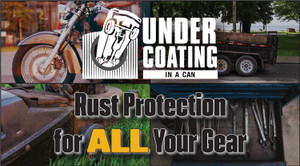Now is the Time to Undercoat Your Vehicle
By on Sep 01 2020

Purchasing a vehicle is a huge investment. Whether it's a light passenger car or a heavy duty commercial truck, you want to get the most out of your purchase. Since the average life expectancy of light passenger vehicles is actually rising, you likely want your car to look just as it performs—and that's good and well.
Another thing to consider if you want the maximum life expectancy for your vehicle is the maintenance of parts and materials. As the length of time people keep their cars increases, the market for aftermarket parts grows, too. The older your car, the more likely components are to break. Or if you're in an area like Northeastern Pennsylvania, the more likely you'll experience that dreaded rust.
Check out Undercoating in a Can's video below on why a specific undercoating product is necessary to help protect the investment that is your vehicle.
Prevention is cheaper than a cure.
Once rust forms, it never really stops. That's why when it comes to your precious vehicle, the best cure is preventative treatment. The best way of dealing with rust is never having to deal with it at all.
You may be thinking, well, that's easier said than done.
Yes and no. Yes, rust can be inevitable. If you live in a region where winter means snow, you're going to see rust on your undercarriage. In the winter, the Department of Transportation and local municipalities treat the roads with magnesium chloride brine before it even snows.
Did you know? Magnesium chloride brine used on roads in winter can cause rust in just 12-18 months. Protect your undercarriage now to save on costly repairs later!
While this protects the road from dangerous ice, it also gets onto your vehicle and is extremely aggressive and corrosive. Aggressive brine plus your unprotected undercarriage does not make a very good experience for your car.
So, what can you do about this problem?
The best solution is to use a preventative coating to protect your vehicle from rust in the first place. But if you're experiencing rust already, don't fret—you can still take action to prevent further spread.
Undercoating in a Can: The Industry Standard
Undercoating in a Can is the premier undercoating that stops corrosion in its tracks and prevents it from starting in the first place. This industrial-strength, solvent-based wax formula adheres to both metal and wood surfaces. It effectively seals off oxygen while still allowing moisture to evaporate through the sprayed film during the curing process.
Maybe you've tried other coatings and weren't impressed with the results. A quick search of aerosol undercoatings can be divisive but just remember: not all coatings are created equal.
If you've used other types of coatings on your undercarriage and were (unhappily) surprised to find rust spread, air and moisture likely seeped through the coating and exacerbated your problem.
But our black wax formulation is different. Thanks to its strong adhesive properties, even if there's a chip or crack in the coating, rust won’t spread underneath. In addition to our black wax, we also offer a full product line to suit different needs, including Clear-Wax Coating, Rubberized Coating, Oil-Based Clear-Fluid Coat, and Polymerized Asphalt Coating. Whether you're looking for protection with a transparent finish or a rubberized layer, we've got the right solution to keep your vehicle rust-free.
How and When to Undercoat
Undercoating your own vehicle or fleet is easy. At PSC, we offer Undercoating in a Can in a variety of sizes, along with essential accessories to accommodate your needs. Whether you just need a few cans to protect your ATV or require a 54-gallon drum to get your fleet in tip-top shape, we’ve got you covered (literally). If you’re interested in learning more about our undercoating accessories, watch this video about our Quikcoat Precision Sprayer .
You can undercoat your vehicle at any time regardless of rust. Prior to coating, knock away all dirt, grime, and loose rust using a power washer, sandblaster, or even a garden hose. If you can use a degreaser, that's even better to remove any residual oil (we recommend using industrial strength Purple Power).






